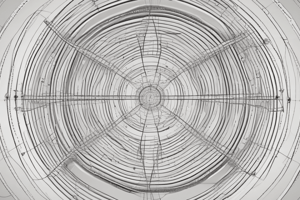Podcast
Questions and Answers
What is a chord?
What is a chord?
A segment whose endpoints are on the circle.
What is a secant?
What is a secant?
A line that intersects a circle at two points.
What is a tangent?
What is a tangent?
A line that intersects a circle at exactly one point.
What are congruent circles?
What are congruent circles?
What are concentric circles?
What are concentric circles?
What are tangent circles?
What are tangent circles?
What is a common tangent?
What is a common tangent?
What does Theorem 12-1 state?
What does Theorem 12-1 state?
What does Theorem 2 (12-1) state?
What does Theorem 2 (12-1) state?
What is a central angle?
What is a central angle?
What defines minor and major arcs?
What defines minor and major arcs?
What does Theorem (12-2) cover?
What does Theorem (12-2) cover?
What does Theorem 2 (12-2) state?
What does Theorem 2 (12-2) state?
What is a sector of a circle?
What is a sector of a circle?
What is a segment of a circle?
What is a segment of a circle?
How do you calculate the length of an arc?
How do you calculate the length of an arc?
What are inscribed angles?
What are inscribed angles?
What does the inscribed angles theorem state?
What does the inscribed angles theorem state?
What does Corollary 1 (12-4) state?
What does Corollary 1 (12-4) state?
What does Theorem 2 (12-4) state?
What does Theorem 2 (12-4) state?
What does Theorem 3 (12-4) cover?
What does Theorem 3 (12-4) cover?
What does Theorem 1 (12-5) state?
What does Theorem 1 (12-5) state?
What does Theorem 2 (12-5) state?
What does Theorem 2 (12-5) state?
What does Theorem 3 (12-5) state?
What does Theorem 3 (12-5) state?
What does the chord chord product theorem state?
What does the chord chord product theorem state?
What does the secant secant product theorem state?
What does the secant secant product theorem state?
What does the secant tangents products theorem state?
What does the secant tangents products theorem state?
Flashcards are hidden until you start studying
Study Notes
Key Definitions and Concepts
- Chord: A line segment with both endpoints on the circle.
- Secant: A line intersecting the circle at two distinct points.
- Tangent: A line that touches the circle at a single point, known as the point of tangency.
Circle Relationships
- Congruent Circles: Circles with equal radius measurements.
- Concentric Circles: Circles that share the same center but have different radii.
- Tangent Circles: Two circles that intersect at exactly one point.
- Common Tangent: A line tangent to two circles; can be internal (between circles) or external (outside both circles).
Fundamental Theorems
- Theorem 12-1: A tangent to a circle is always perpendicular to the radius at the point of tangency.
- Theorem 2 (12-1): Two tangent segments drawn from a single external point to a circle are congruent.
- Theorem 12-2: In a circle, congruent central angles yield congruent chords, which in turn yield congruent arcs.
- Theorem 2 (12-2): A radius or diameter that is perpendicular to a chord bisects the chord and its intercepted arc.
Circle Measurements
- Central Angle: An angle located at the center of the circle.
- Minor Arc: An arc formed by points within a central angle.
- Major Arc: An arc formed by points outside a central angle.
- Sector of a Circle: The area between two radii and their intercepted arc; calculated as (π × radius² × angle measure / 360).
- Segment of a Circle: The area between a chord and its intercepted arc; determined by subtracting the area of the triangle from the area of the sector.
Arc Length Calculation
- Length of an Arc: Computed using the formula (2π × radius × angle measure / 360).
Inscribed Angles and Theorems
- Inscribed Angles: Angles with vertices on the circle and sides that are chords.
- Inscribed Angles Theorem: The angle measure is half that of its intercepted arc.
- Corollary 1 (12-4): All inscribed angles with the same endpoints are congruent.
- Theorem 2 (12-4): An inscribed angle subtends a semicircle if, and only if, it measures 90 degrees.
- Theorem 3 (12-4): In an inscribed quadrilateral, opposite angles are supplementary.
Additional Angle Theorems
- Theorem 1 (12-5): An angle formed outside a circle is equal to one-half the measure of its intercepted arc.
- Theorem 2 (12-5): The measure of an angle inside a circle is one-half the sum of the arcs it intercepts.
- Theorem 3 (12-5): An angle formed outside the circle is one-half the difference of the measures of the intercepted arcs.
Chords and Secants Theorems
- Chord-Chord Product Theorem: The products of the lengths of the segments created by two intersecting chords within a circle are equal.
- Secant-Secant Product Theorem: The product of the whole length and the external part of one secant equals the product of the whole and external part of another secant.
- Secant-Tangent Product Theorem: The product of the secant's whole length and its external length equals the square of the tangent length.
Studying That Suits You
Use AI to generate personalized quizzes and flashcards to suit your learning preferences.




